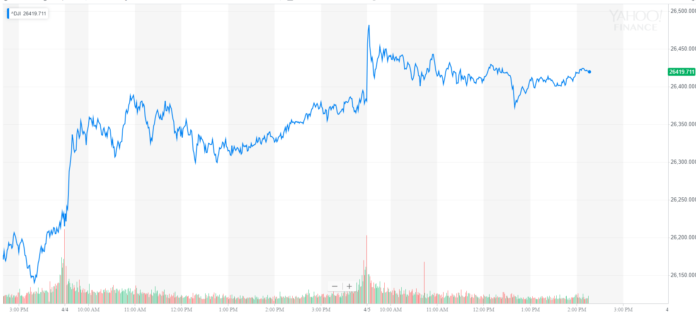[ad_1]
The Dow lagged the broader U.S. stock market on Friday, as shares of the previously ascendant Dow Inc. (D) gave up weekly gains ahead of what’s expected to be a grim earnings season for Wall Street.
Dow Lags While S&P 500 & Nasdaq Rally
All of Wall Street’s major indexes were seen approaching record highs in the final session of the week. The Dow Jones Industrial Average was up more than 100 points through the early morning, reflecting a strong pre-market for U.S. stock futures. The blue-chip index was last up 35 points, or 0.1%, at 26,420.18.
Dow Jones Industrial Average loses steam in the latter stages of Friday’s session. | Chart via Yahoo Finance.
After six consecutive gains, Dow Inc. plunged almost 5%. The chemical company surged after spinning off from DowDuPont earlier in the week.
The broad S&P 500 Index climbed 0.4% to 2,889.67, where it was on track for its seventh consecutive daily advance and its longest winning streak in over a year. Nine of 11 primary sectors catapulted to gains, led by surging energy stocks.
The technology-focused Nasdaq Composite Index closed on a gain of 0.5% to 7,930.57.
Worried about overvaluation risks? Read this exclusive report from Hacked.com: The VIX Tells Us Stocks are Heading for Record Highs; Why Investors Should Be Worried.
Earnings in Focus

Wells Fargo will report earnings next week as a potentially-brutal earnings season threatens to derail the Dow recovery. | Source: Shutterstock
Corporate earnings season begins in earnest next week, with the likes of Rite Aid Corp (RAD), JPMorgan Chase and Co (JPM), and Wells Fargo & Co (WFC) all scheduled to report. For the first time since 2016, quarterly earnings are expected to decline from a year earlier, signaling renewed risks for American companies.
Signs of earnings-related headwinds were first spotted by FactSet early this year after the research firm reported a decline in so-called bottom-up EPS estimates. This was reiterated in the most recent report:
“The Q1 bottom-up EPS estimate (which is an aggregation of the median EPS estimates of all the companies in the index) dropped by 7.2% (to $37.33 from $40.21) during [the first quarter].”
Corporate earnings are declining at a time when global growth is stagnating. The International Monetary Fund, World Bank, and Organization for Economic Cooperation and Development have all lowered their forecasts for global growth this year, citing China-related volatility and weakness in advanced industrialized nations like Germany, the United Kingdom, and Japan. By comparison, the United States is holding up fairly well, although growth has weakened significantly in the last two quarters.
[ad_2]
Source link
